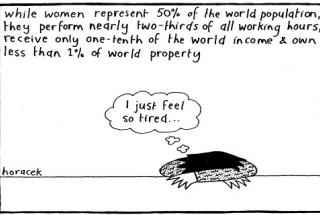A Gender Lens on the Budget

Budget 2016-17 fails to bring Australian women into the centre of the economy and pushes many further into poverty. Cuts to overseas aid hurt vulnerable women in our region.
The budget is far from fair, with just a touch of the white picket fence. It provides tax breaks for the wealthy, while low to middle income families are hit by ‘zombie’ savings from the Abbott-Hockey horror budgets. It is lacking in investments in education and training reforms which might drive innovation and jobs.
Health spending is being heavily cut. By the end of week one of the election campaign the Government was trying to negotiate a compromise with the medical profession on its pathology ‘savings’. Savings measures in Health will disadvantage women, particularly those with chronic conditions, far more than any benefit from the handful of modest measures to change some approaches. Notwithstanding $100m for a national awareness strategy, services for women enduring or exiting domestic violence are suffering funding cuts. Delays will increase in the Family Court. New funding and eligibility changes to the National Disability Insurance Scheme will disproportionately disadvantage women while pushing costs of services for those left outside back onto state and territory hospitals and law enforcement systems.
The proposed taxation benefits for female small-medium enterprise (SME) entrepreneurs are oversold, with most of the returns going to SMEs with male heads.
Superannuation changes are the only single area where changes are beneficial for women, and are welcome, notwithstanding the seeming presumption that women will have partners willing to transfer money into their super. As the recent Senate report said, a husband is not a retirement plan.
Overall, in an environment where many economists have reservations about the underlying economic assumptions of the budget, philosophically it is a document based on Reagonomics – the theory of trickle down.
We have recommended that given the critical importance for women of sound fiscal policies which will support social infrastructure, the Government reconsider many of its decisions, and in particular consider both revenue as well as prudent spending approaches.
Careful, expert, non-partisan analysis of this budget has led us to make recommendations across a range of policy areas – workplace relations, health, education, housing, domestic violence, taxation, superannuation and more, as well as some related to machinery of government and data collections which we hope will both improve capacity to properly analyse the impacts on women and girls.
Read the full article here.
Updated: 16 July 2024/Responsible Officer: Crawford Engagement/Page Contact: CAP Web Team










